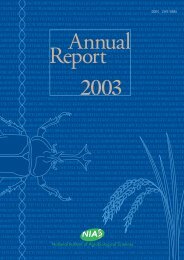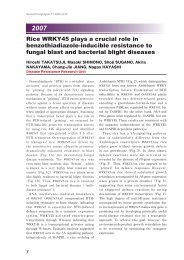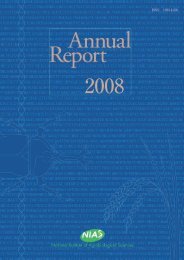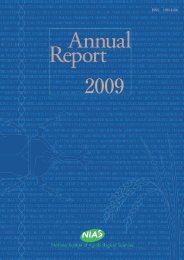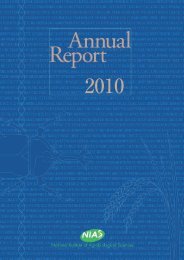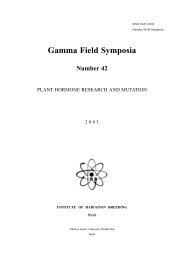Annual Report 2006
Annual Report 2006
Annual Report 2006
You also want an ePaper? Increase the reach of your titles
YUMPU automatically turns print PDFs into web optimized ePapers that Google loves.
Insect and Animal Sciences Division<br />
The Insect and Animal Sciences Division<br />
consists of the following six departments.<br />
The Developmental Biology Department is<br />
conducting research to elucidate the<br />
physiological functions of germ cell lines and<br />
the hormonal mechanism underlying growth<br />
regulation, and to develop embryonic technologies<br />
as well. These researches focus on several<br />
invertebrates and vertebrates.<br />
The Molecular Biology and Immunology<br />
Department is concerned with the molecular<br />
events involved in the signaling for<br />
antibacterial peptide synthesis in insects and<br />
signaling of cytokines and T cell receptors in<br />
mammals, the functional analysis of macrophage<br />
/microglia, hematopoietic stem cells and T cell<br />
subsets, the genetic mechanisms underlying<br />
complex disease traits, and the development<br />
and improvement of transgenic animal<br />
technology. Major research on cytokine<br />
signaling in the mammalian immune system,<br />
innate immune system in insect, the<br />
transformation of spermatogenic cells in vivo<br />
and genetic analysis of multi-factorial are being<br />
conducted.<br />
The Physiology and Genetic Regulation<br />
Department aims to elucidate the mechanisms<br />
of unique physiological phenomena observed in<br />
insects and animals. The studies include<br />
analyses of neural functions including brain,<br />
metabolic regulation, and physiological bases<br />
for adaptation to environment, perception and<br />
function of behavior regulating chemicals, cell<br />
differentiation and the genes regulating them,<br />
in both invertebrates and vertebrates.<br />
The research activities of the Insect<br />
Genetics and Evolution Department are mainly<br />
focused on molecular and conventional genetics<br />
of insects including silkworm, biochemical<br />
analyses of insect-plant interaction,<br />
characterization and breeding of natural<br />
enemies, and basic and applied studies on insect<br />
-associated microbes including pathogens and<br />
symbiotes.<br />
The Insect Biomaterial and Technology<br />
Department is carrying out research which<br />
aims to develop the biomimetic techniques of<br />
insects and their utilization such as the sugar<br />
reception of the flesh fly, and to clarify the<br />
characteristics of insect-born biomaterials for<br />
the development of new technologies.<br />
The major targets of the Insect<br />
Biotechnology and Sericology Department are<br />
the development of functional insect cell lines<br />
and transgenic insects, large-scale production of<br />
useful substances using the transgenic insect<br />
systems, and the development of new silk<br />
materials which are good for healthful and<br />
wealthy human life by developing new<br />
sericultural technologies including breeding of<br />
characteristic new varieties of silkworms.<br />
The major research topics for 2005 from<br />
these six departments in the Insect and Animal<br />
Sciences Division are as follows:




